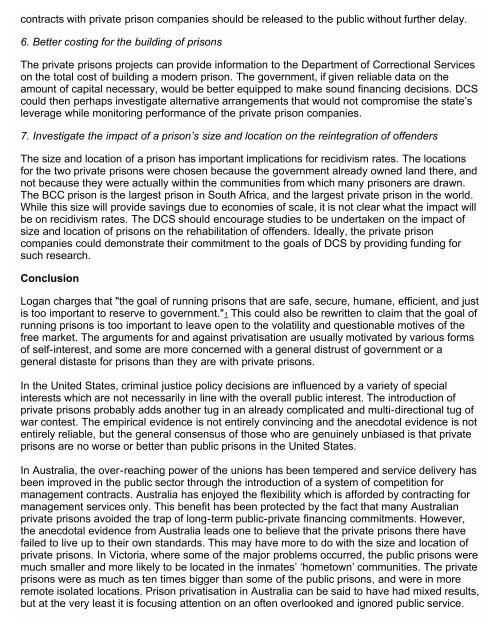prison privatisation in south africa issues, challenges and ...
prison privatisation in south africa issues, challenges and ...
prison privatisation in south africa issues, challenges and ...
Create successful ePaper yourself
Turn your PDF publications into a flip-book with our unique Google optimized e-Paper software.
contracts with private <strong>prison</strong> companies should be released to the public without further delay.<br />
6. Better cost<strong>in</strong>g for the build<strong>in</strong>g of <strong>prison</strong>s<br />
The private <strong>prison</strong>s projects can provide <strong>in</strong>formation to the Department of Correctional Services<br />
on the total cost of build<strong>in</strong>g a modern <strong>prison</strong>. The government, if given reliable data on the<br />
amount of capital necessary, would be better equipped to make sound f<strong>in</strong>anc<strong>in</strong>g decisions. DCS<br />
could then perhaps <strong>in</strong>vestigate alternative arrangements that would not compromise the state’s<br />
leverage while monitor<strong>in</strong>g performance of the private <strong>prison</strong> companies.<br />
7. Investigate the impact of a <strong>prison</strong>’s size <strong>and</strong> location on the re<strong>in</strong>tegration of offenders<br />
The size <strong>and</strong> location of a <strong>prison</strong> has important implications for recidivism rates. The locations<br />
for the two private <strong>prison</strong>s were chosen because the government already owned l<strong>and</strong> there, <strong>and</strong><br />
not because they were actually with<strong>in</strong> the communities from which many <strong>prison</strong>ers are drawn.<br />
The BCC <strong>prison</strong> is the largest <strong>prison</strong> <strong>in</strong> South Africa, <strong>and</strong> the largest private <strong>prison</strong> <strong>in</strong> the world.<br />
While this size will provide sav<strong>in</strong>gs due to economies of scale, it is not clear what the impact will<br />
be on recidivism rates. The DCS should encourage studies to be undertaken on the impact of<br />
size <strong>and</strong> location of <strong>prison</strong>s on the rehabilitation of offenders. Ideally, the private <strong>prison</strong><br />
companies could demonstrate their commitment to the goals of DCS by provid<strong>in</strong>g fund<strong>in</strong>g for<br />
such research.<br />
Conclusion<br />
Logan charges that "the goal of runn<strong>in</strong>g <strong>prison</strong>s that are safe, secure, humane, efficient, <strong>and</strong> just<br />
is too important to reserve to government."1 This could also be rewritten to claim that the goal of<br />
runn<strong>in</strong>g <strong>prison</strong>s is too important to leave open to the volatility <strong>and</strong> questionable motives of the<br />
free market. The arguments for <strong>and</strong> aga<strong>in</strong>st <strong>privatisation</strong> are usually motivated by various forms<br />
of self-<strong>in</strong>terest, <strong>and</strong> some are more concerned with a general distrust of government or a<br />
general distaste for <strong>prison</strong>s than they are with private <strong>prison</strong>s.<br />
In the United States, crim<strong>in</strong>al justice policy decisions are <strong>in</strong>fluenced by a variety of special<br />
<strong>in</strong>terests which are not necessarily <strong>in</strong> l<strong>in</strong>e with the overall public <strong>in</strong>terest. The <strong>in</strong>troduction of<br />
private <strong>prison</strong>s probably adds another tug <strong>in</strong> an already complicated <strong>and</strong> multi-directional tug of<br />
war contest. The empirical evidence is not entirely conv<strong>in</strong>c<strong>in</strong>g <strong>and</strong> the anecdotal evidence is not<br />
entirely reliable, but the general consensus of those who are genu<strong>in</strong>ely unbiased is that private<br />
<strong>prison</strong>s are no worse or better than public <strong>prison</strong>s <strong>in</strong> the United States.<br />
In Australia, the over-reach<strong>in</strong>g power of the unions has been tempered <strong>and</strong> service delivery has<br />
been improved <strong>in</strong> the public sector through the <strong>in</strong>troduction of a system of competition for<br />
management contracts. Australia has enjoyed the flexibility which is afforded by contract<strong>in</strong>g for<br />
management services only. This benefit has been protected by the fact that many Australian<br />
private <strong>prison</strong>s avoided the trap of long-term public-private f<strong>in</strong>anc<strong>in</strong>g commitments. However,<br />
the anecdotal evidence from Australia leads one to believe that the private <strong>prison</strong>s there have<br />
failed to live up to their own st<strong>and</strong>ards. This may have more to do with the size <strong>and</strong> location of<br />
private <strong>prison</strong>s. In Victoria, where some of the major problems occurred, the public <strong>prison</strong>s were<br />
much smaller <strong>and</strong> more likely to be located <strong>in</strong> the <strong>in</strong>mates’ ‘hometown’ communities. The private<br />
<strong>prison</strong>s were as much as ten times bigger than some of the public <strong>prison</strong>s, <strong>and</strong> were <strong>in</strong> more<br />
remote isolated locations. Prison <strong>privatisation</strong> <strong>in</strong> Australia can be said to have had mixed results,<br />
but at the very least it is focus<strong>in</strong>g attention on an often overlooked <strong>and</strong> ignored public service.
















